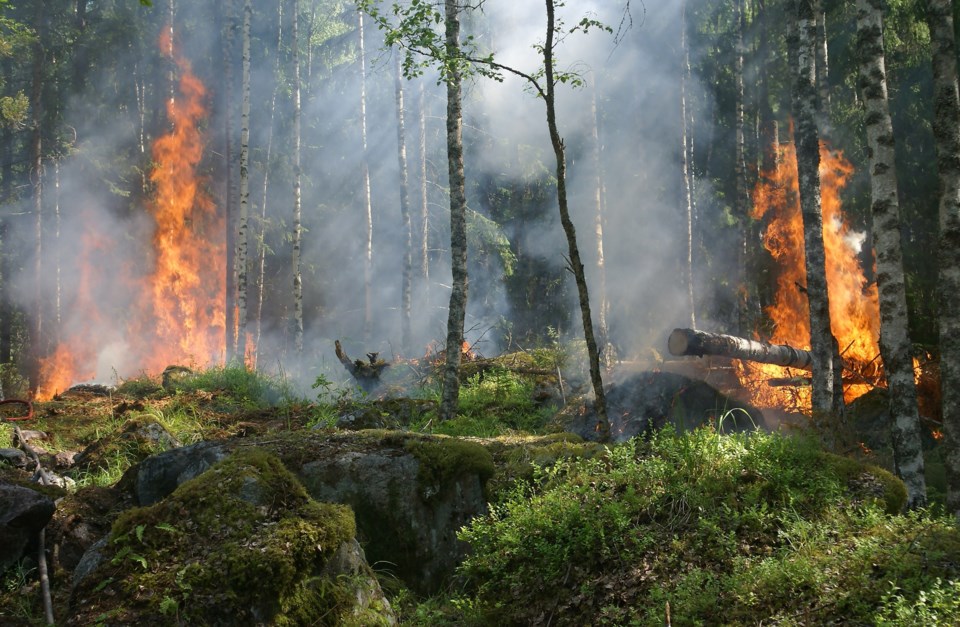Forest fires in northern Ontario and Quebec have contributed to alerts about poor air quality being posted throughout the region, and our local health unit urges people to heed the warnings.
Special air-quality statements have been issued for many parts of the province and particularly here in Simcoe County. High levels of air pollution have developed due to smoke from forest fires in the northeast and northwest parts of Ontario.
There are 47 active fires happening more than 500 kilometres from Barrie, but their effects are being felt here in the city.
Dr. Emil Prikryl, who's a public health and preventive medicine resident physician with the Simcoe Muskoka District Health Unit, says it's hard to tell if the smoke from the ongoing fires has caused any immediate health issues locally, but it's something they are keeping an eye on.
“Data isn’t immediately available — sometimes it can take a few hours, maybe a day or two or more — but one of our partner health units looks at emergency department health visits and that is hour-by-hour sometimes,” Prikryl told BarrieToday. “So far, as early as it is, there aren’t any clear trends of emergency room visits as it is impacting the health of our community, but it is still too early.”
Air quality and visibility due to wildfire smoke can fluctuate over short distances, and can vary considerably from hour to hour. A recent report from Environment Canada says the current situation could last for at least the rest of the week.
While Prikryl says everyone should watch for advisories, he suggests that the elderly, children, pregnant women, people with lung disease (such as asthma) or heart disease, as well as people who work outdoors, take extra precautions for now until air quality improves.
Smoke from the wildfires can cause significant dangers, he said.
“Any smoke is bad for your lungs and your heart, but when it comes to wildfire smoke, I like to think of it as combustion," Prikryl said. "When you have complete, perfect combustion during a fire, you get just water and carbon dioxide. But wildfires have all kinds of weird chemicals that result from it.
"You get carbon monoxide to benzyne to many small particles and sulfur dioxide," the doctor added. "But there are just so many things that make up the smoke from a wildfire and it can be very dangerous.”
Coughing and wheezing are some of the obvious signs of declining air quality, but there can also be severe symptoms you are in trouble, such as dizziness, chest pains and heart palpitations.
“You could very well be at risk of heart attacks, strokes and premature death. It can be very serious,” Prikryl said.
Some local schools are beginning to monitor the air quality and how it affects daily activities.
St. Monica’s Catholic School in Barrie, for example, is going ahead with its Primary Track and Field Day.
“After much deliberation, we have decided to carry on with the activities," the east-end school said in a note to parents. "The smoke advisories could last for the next couple of weeks. As well, we have our Grade 3 EQAO that is happening within the next few days, so we don't really have many options to move to."
The Steel Street school says it has a built-in station for drinks and rest.
“We will be breaking for lunch halfway through and monitoring our students closely," the school's notice says. "If we find that the air quality is too much, we will cut our activities short.”
Prikryl said exercising caution is why advisories are issued, and suggested people should take them seriously.
“That's what they’re for, particularly for the ones mentioned before who are at higher risk," he said. "Now is a good time to heed the advisories and rescue your outdoor activities.
"Watch for some nose, eye and throat irritation, regardless of your risk level," Prikryl added. "I would also suggest a well-fitted type respirator mask if you need to be out and need to take additional precautions.”
Barrie Fire and Emergency Service’s dispatch centre is seeing an increase in calls for the smell of smoke in the area. The city says these types of calls tie up resources looking for possible fires. If there is no visible smoke or flame coming from a vehicle or structure, the city asks people to consider if the smell is possibly that of wildfire smoke in the air.



